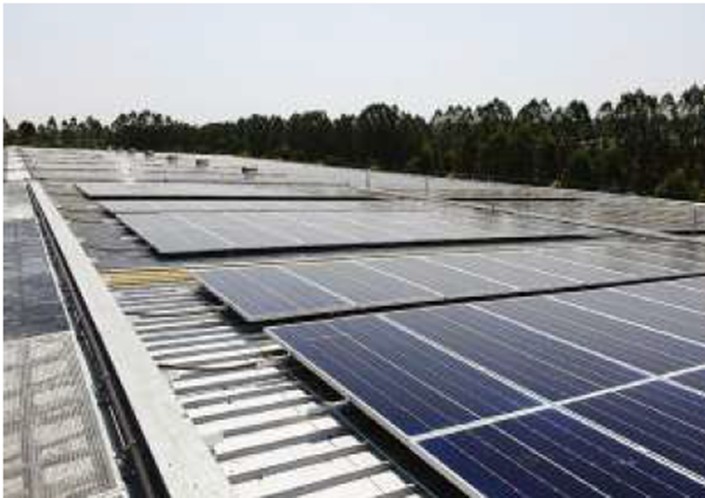Climate Resilience
Promoting Energy-Efficient Technology and Cutting GHG Emissions
Target
- Net Zero Emissions by 2050
- 20% greenhouse gas emissions reduction in 2030 from base year 2020
- 13% energy consumption reduction in 2030 compared with BAU at the base year 2007
2022 Performances
- GHG reduction 12.05%
- Energy reduction 6.73%
Strategy
- Increase the share of biomass and renewable energy that substitute fossil fuel.
- Improve or modify processes and equipment to enhance energy efficiency.
- R&D of technology to drive Net Zero emissions target in 2050.
- Develop products, services and solutions that reduce GHG emissions across the value chain.
- Apply economic tools to promote greenhouse gas emissions reduction.
- Reforestation and rehabilitation of terrestrial forest, mangrove and seagrass as carbon sink.
- Awareness raising on energy conservation and climate resilience among employees and contractors.
Management
- Set emissions reduction target in line with the Paris agreement and goal to keep global warming to below 1.5 degrees Celsius and Net Zero by 2050.
- Prepare measures to enhance and drive energy efficiency across all business units.
- Prepare and disclose climate-related issues according to TCFD and SBTi.
- Monitor and regulate climate resilience agenda by Board of Directors and top executives on quarterly basis.
- Advocacy and action by the Climate Change and Energy Committee which meets quarterly.

Climate resilience is a prominent global issue this past year, resulting in law enforcement risk and opportunity towards low carbon economy. SCG sets Net Zero target in 2050 and its science-based targets initiative is under validation process, while continuing to implement the strategies and measures towards achieving Net Zero target.
Boosting Energy Efficiency Through Automation
Chemicals Business applies digital technology to automate its measuring and control system, resulting in higher efficiency of the production at its Rayong Olefins plant through:

• Integrated Steam Optimization. Digitalization of highly complex control and calibration of steam system by using Data Analytics for automated adjustment of appropriate steam function.
• Unlock Furnace Gap by Data Analytics. The objective is to improve performance of furnace, which is the most energy-intensive equipment in the plant, by using Data Analytics conduct auto mated Decoke and Heat Distribution management with Machine Learning that studies and accurately forecasts Furnace behavior.
These two projects contributed to reduce energy consumption and GHG emissions by a total of 8,030 ton CO2 per year.
In 2021, Rayong Olefins Co., Ltd. received an Industry 4.0 Award, Smart Energy Category, and Smart Factory and Eco Factory Award from the Industrial Estate Authority of Thailand.
SCGP (Packaging Business) applies digitalization and automation of equipment and machinery in paper production at Siam Kraft Industry’s factory, aiming at process optimization and energy efficiency.
- Hood & Ventilation Balance Control System, using Data Analytics process online in Dryer Part, to replace the manual control which requires four hours adjustment process to hit the target. Finally, this results in a quick response and an efficient balance to control the system.
- Pulper Consistency Control System, this project seeks to improve production efficiency in the Pulper Section, which is most energy intense, by installing radar sensors and programs to control the intensity of pulper to achieve higher stability resulting in higher productivity and less energy use per production unit.
- Aeration Optimization automates the switching of the wastewater treatment system based on online wastewater quality monitoring. Altogether, these three projects save energy use totaling 53,413 gigajoule per year and reducing GHG emissions by 7,762 ton CO2 per year.

Scaling Up Solar Energy and Biomass
Cement-Building Materials Business has scaled up rooftop solar energy generation internally and externally, bringing total installed capacity to date of 18,923 megawatt-hours per year, reducing GHG emissions by 9,460 tons CO2 per year. It has increased the share of biomass from agricultural waste through implementation of its Energy Pellet project and from other sources, cutting 3.25 million ton CO2 per year of emissions.
RIL 1996 Company Limited, Chemicals Business scaled up its solar energy operation by providing rooftop solar solutions to office and factory rooftop space of five companies located in Map Ta Phut Industrial Estate namely: Thai Polyethylene Company Limited, Map Ta Phut Olefins Company Limited, Grand Siam Composite Company Limited, Thai MFC Company Limited and Map Ta Phut Tank Terminal Company Limited. Altogether the installed capacity is up to 1.78 megawatts of outputs to supply electricity demand inside building, cutting GHG emissions by 1,301 ton CO2 per year. At the same time these efforts contribute to the Eco Industrial Town drive towards sustainability.

SCGP (Packaging Business) has expanded its solar energy capacity to 11.78 megawatt, reducing GHG emissions totaling 8,757 ton CO2 per year. It also boosts the biomass utilization through a sugarcane leaf buying scheme from farmers to meet the increasing demands of machineries that have been improved to use the biomass. The effort helps bring down GHG emissions by 277,440 ton CO2 per year.
Indoor Air Pollution Treatment System
This system uses AI technology to improve indoor air quality and ventilation in building through HVAC Air Scrubber innovation that absorbs more than 30 types of toxic substance, reducing the burden of air conditioning units, energy sufficiency, and cutting GHG emissions by at least 8 kg CO2 per square meter per year, and absorbing carbon dioxide in the building to less than 750 ppm. The system is chosen one of the nine outstanding Innovations, Smart Heat & Air category by The Clean Fight 2020 New York, USA.
